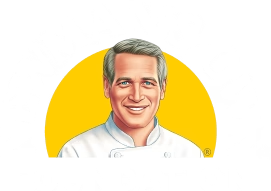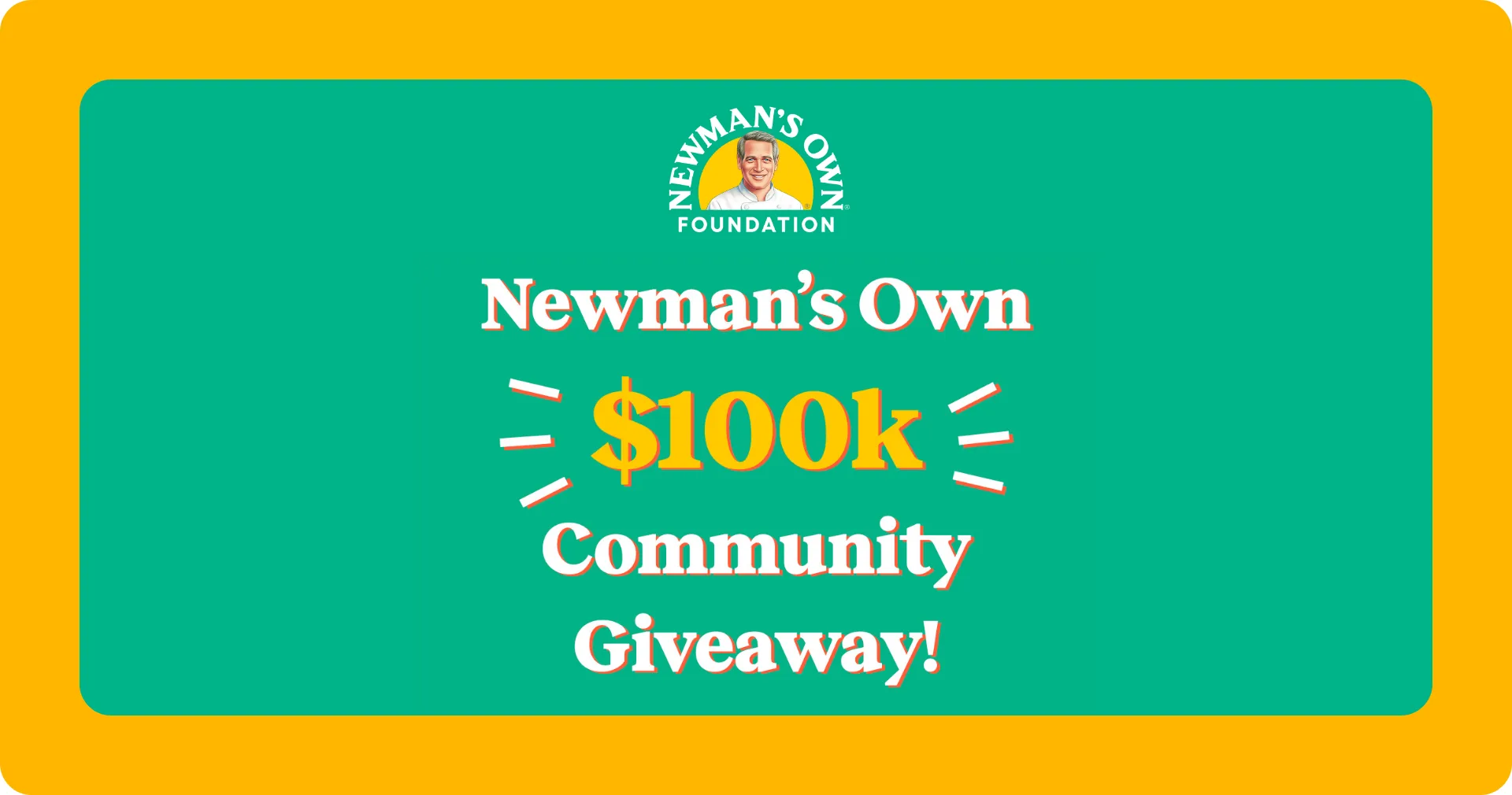For the month of #GivingTuesday, we’re doing something different, and asking YOU to vote and help us give away $100,000+ of our funds to food justice for kids.
What are we doing here?
We’re giving everyone the chance to participate in our Newman’s Own Community Fund and give away at least $100,000 of funding to incredible food justice organizations. It’s free to join the Newman’s Own Community Fund, and then you will get to vote on a shortlist of our 2023 grantee partners from both our Nutritious Food in Schools and our Indigenous Food Justice program areas.
Join and vote here! [Or learn how to join and vote here.]
Why are we doing this?
We want to lean into the practices of participatory and collective giving (Sara Lomelin’s TED talk explains this concept beautifully). These practices are not new. In fact, they show up in many cultures throughout the ages, for example centuries-old West African and Carribean Susus—informal lending clubs—where community contributions support a fellow member when they’re in need. Paul Newman started a version of this—at the end of every year, he sought recommendations from his own community on worthy organizations to give to, in line with his commitment to give away all profits from the sale of Newman’s Own products, one that we continue to this day.
With modern technology and tools such as Grapevine, we can now involve more people in this community—our grantee partners, our employees, and the general public. After all, the money of the Foundation comes from 100% of the profits and royalties from the sale of Newman’s Own products. Our donors are in fact the millions of consumers who have purchased salad dressing, popcorn, pizza, and now dog treats over the last 40 years—thank you!
It’s a great time for us to get started, given November 28 is #GivingTuesday. But instead of asking people to give more (I mean, you can, and in fact we welcome additional donations for sure!), we’re doing something different here. We’re asking people to give away our funds through community voting!
How this will work
We have at least $100,000 set aside as a prize pool: $50k for Indigenous Food Justice and $50k for Nutritious Food in Schools grantee partners. The Newman’s Own Community Fund members will have the opportunity to vote on a shortlist of selected grantee partners from each program area to help decide where this funding goes. It’s free to join as a member and free to vote, although donations are welcome if you want to add to the pool. We will in fact match the first $10,000 raised through small donations in the fund, so we hope to be able to give out more than $100,000!
Voting opens November 1, 2023, at 12:00 p.m. Eastern Time, and it’s one vote for each category per person, with final votes cast by November 28, 2023, at 11:45 p.m. Eastern Time.
Based on the total number of votes, there will be three prizes for each program area (so 6 prizes total): $25,000, $15,000 and $10,000, as well as a share of the pooled funds raised and matched in addition.
Our participating grantee partners:
Program Area: Nutritious Food in Schools
- Chef Ann Foundation
The Chef Ann Foundation ensures that school food professionals have the resources, funding, and support they need to provide fresh, healthy, delicious, cooked-from-scratch meals that support the health of children and the planet. - Green Bronx Machine
Green Bronx Machine (GBM) builds healthy, equitable, and resilient communities through inspired education, local food systems, and 21st century workforce development. Dedicated to cultivating minds and harvesting hope, GBM’s school-based model, using urban agriculture aligned to key school performance indicators, grows healthy students and high-performing schools to transform communities that are fragmented and marginalized into neighborhoods that are inclusive and thriving. GBM grows vegetables, the vegetables grow students, and the students grow happy, healthy, and thriving classrooms, schools, and communities en-route to better health outcomes. - Groundwork Center for Resilient Communities
Founded in 1995, Groundwork develops sustainable local-based solutions in local food, clean energy, and livable towns. Groundwork supports the outreach, advocacy, and policy engagement on the 10 Cents a Meal for Michigan’s Kids & Farms, a state program implemented by the Michigan Department of Education, that provides schools and early childhood education centers with up to 10 cents per meal in match funding to purchase and serve Michigan-grown fruits, vegetables, and dry beans. - Healthy Harvest of North Iowa
Healthy Harvest of North Iowa connects and educates in support of the local food system. The nonprofit partners with regional school districts, early care centers, local food hubs, extension offices, and more to increase the procurement of local foods into cafeterias for the youth of North Iowa, school garden and greenhouse activities, and related nutrition education in the classroom. - Mississippi Farm to School Network
The Mississippi Farm to School Network builds strong connections within Mississippi communities by promoting healthy, locally grown foods and supporting local producers. By implementing changes in food purchasing and education practices at schools and early childcare institutions, students can access nutrient-dense locally grown foods and educational opportunities, such as school gardens, cooking demos, and farm field trips. - National Farm to School Network
The mission of the National Farm to School Network (NFSN) is to increase access to local food, gardens, and nutrition and agriculture education to improve children’s health, strengthen family farms, and cultivate vibrant communities. NFSN envisions a nation in which farm to school and farm to early care and education are essential components of strong and just local and regional food systems. NFSN works to develop a strong network of partners across sectors, build awareness about farm to school, and increase activities at the state and regional levels through training, capacity building, and policy advocacy. - Wellness in the Schools
Wellness in the Schools (WITS) is a national nonprofit that teaches public school students healthy habits to learn, live, and thrive. WITS partners with public schools, chefs, and coaches to expand access to nourishing food and active play.
Program Area: Indigenous Food Justice
- Cheyenne River Youth Project
The Cheyenne River Youth Project is dedicated to providing the young people on the Cheyenne River Sioux Reservation with the resources and opportunities they need to build a future in which they will do more than survive—they will thrive. A critical part of its programming is Native Food Sovereignty, which includes the 2.5-acre Winyan Toka Win (Leading Lady) Garden, Native Food Sovereignty Teen Internships, and Garden Club for 4- to 12-year-olds. - Dream of Wild Health
The mission of Dream of Wild Health is to restore health and well-being in the Native community by recovering knowledge of and access to healthy Indigenous foods, medicines, and lifeways. To achieve this vision, staff work to build community, share Indigenous traditional knowledge, teach about and advocate for food sovereignty, host workshops and community events, and support community partner organizations, schools, and Tribal communities. - First Nations Development Institute
The mission of First Nations Development Institute (FNDI) is to strengthen American Indian economies, in turn, supporting healthy Native communities. Through its Nourishing Native Food and Health program, FNDI supports tribes and Native communities in building Indigenous food systems that improve community health, increase control over Native agriculture and food, and reaffirm culture through Indigenous land stewardship practices and understandings. This focus includes reaching the next generation of Native food producers by investing in Native-led organizations that are working toward stronger food economies, food systems, and food security through youth education. - Kake Tribal Heritage Foundation
Located in Southeast Alaska, Kake Tribal Corporation’s mission is to serve shareholders and their descendants by preserving culture, protecting shared lands, and enhancing the community’s financial security. Its internship program offers high school students the opportunity to increase their knowledge of food security, their ability to grow and use hydroponics food, and their skills in harvesting and processing traditional wild foods (e.g. salmon, berries, beach greens, deer, and shellfish) for eating and sharing with family and Tribal Elders. - Mino Bimaadiziiwin Tribal Farm
Mino Bimaadiziiwin (The Good Life) Tribal Farm, a hub of food sovereignty efforts in Gaa-Miskwaabikaang (Place of the Red Cliffs / Red Cliff Band of Lake Superior Chippewa), is located on Lake Superior where hunting, fishing, and gathering is central to Annishinaabe food systems, food sovereignty, and cultural traditions. As such, these funds will be used to create youth-driven outdoor classrooms and support cultural camps that will connect youth to the land, their culture, and build their self-esteem and pride as Indigenous youth. - North American Traditional Indigenous Food Systems (NATIFS)
North American Traditional Indigenous Food Systems (NĀTIFS) is the nonprofit founded by Lakota Chef Sean Sherman of The Sioux Chef. NĀTIFS and the Indigenous Food Lab are working to address the economic and health crises affecting Native communities by re-establishing Native foodways; its mission is to promote Indigenous foodways education and facilitate Indigenous food access. - Wabanaki Health and Wellness
Wabanaki Public Health & Wellness serves the Houlton Band of Maliseet Indians, the Aroostook Band of Micmacs, the Passamaquoddy Tribe at Indian Township, the Passamaquoddy Tribe at Pleasant Point, and the Penobscot Nation. Its mission is to provide community-driven, culturally centered public health and social services to all Wabanaki communities and people while honoring Wabanaki cultural knowledge, cultivating innovation, and fostering collaboration. Youth engagement is provided through culturally centered after-school activities and special events, including The Learning Kitchen, which offers youth a chance to try traditional foods, learn how to prepare them, and share what they learn with their families. - Wai’anae Community Re-Development Corporation (MA’O Organic Farms)
Wai’anae Community Re-Development Corporation is building a future of mā’ona, of plenty, by connecting youth and land through the daily practice of aloha ‘āina, empowering youth to succeed in college and secure sustaining careers, and growing organic produce that yields individual and communal vitality.
To see the Newman’s Own $100k Community Giveaway Rules, please click here.


